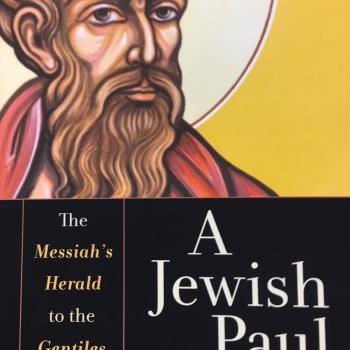Jewish theology understands itself as the result of several, interconnected Covenants described in the Hebrew Scriptures.
The biblical view of Covenant is similar to that of a contract, although a Covenant is much more solemn – it’s not a business arrangement, but a sacred relationship, much like a marriage. A Covenant binds two parties together, committing each to a set of responsibilities and obligations.
There’s the Covenant with Abraham, then one with Noah (but that’s intended for everyone, not just Jews), then one with Moses, from which we derive the Mosaic laws, and then another with David, and so on.
In general, Jews understand themselves as bound to God (how ever we understand God) in a set of sacred duties, responsibilities, and obligations. God is just as bound as we are – in terms of the Covenant, both parties have equal standing, may demand fulfillment of the agreement, and so on.
In this sense, Jewish views on salvation and redemption are much like that of the Catholics, Eastern Orthodox, and Anglicans – we’re saved corporately, through our belonging to the body, by being part of the community, by being in the Covenant.
Standing at Sinai – the Giving of the Covenant
Jewish tradition speaks of the giving of Torah at Sinai. God’s offering to the Jewish people, an eternal Covenant as contained in Torah.
Here’s the gist of the story – the Jews are freed from the slavery of Egypt – liberated from the restricted, narrow ways that enslaved them. They’re reborn through their passage through the waters and sent to wander in the purifying and focusing experience of the wilderness.
The Jews finally arrive at Mt. Sinai. Moses ascends the mountain and is given the Commandments, symbolic of God’s ways, God’s teaching. Every Jew present at the base of the mountain experiences God’s invitation to enter the Covenant – asked to use their newly gained freedom to walk the path of life. Yahweh offered the Jews a Covenant and the Jews said yes.
Some liken Sinai to a wedding proposal. Others say God was silent and spoke spiritually to every Jew present. Some say the Jews received the tablets of the Ten Commandments. Others say the entire Torah was read. Still others say the entire way of being and living was revealed.
I’m not sure what happened, exactly. I only know that I was there. Tradition says that every Jew who ever lived or who will ever live was spiritually present at Sinai at the giving of the Covenant.
Breaking Open the Covenant
Jews don’t view their relationship with God as an exclusive one. Yes, we have a particular Covenant, and a particular history, set of traditions – a real relationship throughout history. But Jews don’t think that we’re the only ones God loves, or relates to, or even makes Covenants with. This means, that Judaism understands that it is not the only way to a meaningful life or salvation.
Christianity also has strong aspects of its theology rooted in Covenant. Christians often refer to Christianity as the New Covenant. Christian theology contains multiple opinions on whether the New Covenant is fully separate from the Jewish one, or whether it’s an extension, update, or the gentile version of the same thing. Regardless, Christians also understand their salvation and meaning in terms of Covenantal relationship.
Vatican II offered a significant development in Jewish-Christian relations and mutual understanding. The Council Fathers sincerely wanted to free the Church of anti-Jewish polemics which led to anti-semitism, oppression, suffering, and even killing. (Sadly, this healing and peaceful trend of friendship is being challenged today by elements within conservative and traditional movements within Catholicism.)
In the Council documents, particularly, Nostra Aetate, the Church clarified its conceptions of Jews and Judaism. The Church stated that the Jewish Covenant was eternal and valid and salvific. Shortly after, many mainstream Protestant churches also issued a series of official statements that affirm the eternal nature of God’s ancient covenant with the Jewish people. New theological thinking emerged as part of the developing Jewish-Christian dialogue, and gradually Jewish theologians began to respond.
One of the clearest and most significant works in this area is Opening the Covenant – A Jewish Theology of Christianity, by Rabbi and scholar, Michael Kogan.
Kogan surveys the theologies of the two faiths to locate precise points of difference and convergence. His conclusion?
He sees Christianity as the breaking open of the original Covenant to include Gentile peoples. God has brought this about, says Kogan, through the work of Jesus and his interpreters. Christians are now grafted into the Eternal Covenant at Sinai – although under different terms.
If Christianity is a divinely inspired movement, then Judaism must reevaluate its response. Kogan is clear that accepting the validity of Christianity in no way compromises the truth of Judaism itself but will cause Jews to understand their own faith more fully by locating it in the larger context of God’s universal redemptive plan.
Kogan calls for each tradition to receive the wisdom of the other as a means of self-understanding. Once each faith is freed to find God’s purpose in the other, the way will be open to a liberating pluralism in which Jews and Christians come to see each other as siblings sharing a universal role as God’s witnesses, the builders of God’s Kingdom on Earth. Neither faith can do this world-redemptive work alone.
The Orthodox Response
Kogan is a rabbi with the Conservative movement, a branch of Liberal Judaism. It is therefore interesting to ask how our Orthodox brothers and sisters view the ongoing Christian-Jewish dialog.
In 2015, a group of prominent, well-respected Orthodox Rabbis offered their own statement, To Do the Will of Our Father in Heaven: Toward a Partnership between Jews and Christians.
What did these Rabbis have to say?
“We acknowledge that the emergence of Christianity in human history is neither an accident nor an error, but the willed divine outcome and gift to the nations.”
“Christians are congregations that work for the sake of heaven who are destined to endure, whose intent is for the sake of heaven and whose reward will not denied.”
“We Jews and Christians have more in common than what divides us: the ethical monotheism of Abraham; the relationship with the One Creator of Heaven and Earth, Who loves and cares for all of us; Jewish Sacred Scriptures; a belief in a binding tradition; and the values of life, family, compassionate righteousness, justice, inalienable freedom, universal love and ultimate world peace.”
Relativism? Universalism?
Are such views indicative of a relativistic universalism? No. The significant differences between the traditions are acknowledged, the sad history between our communities isn’t swept under the carpet, and both sides acknowledge there is more work to do – both in terms of mutual understanding – and in terms of healing a broken world.
So, perhaps our Christian friends were there with us, too, at Sinai – standing right next to us, hearing God proclaim the way of life and love to the world. Search your soul, you might remember.















